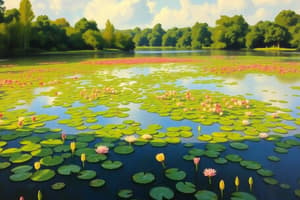Podcast
Questions and Answers
What feature characterizes a stable ecological system?
What feature characterizes a stable ecological system?
- High variability in states
- Consistently changing states
- Low variability in states (correct)
- Unpredictable environmental conditions
What is the role of negative feedback loops in an ecosystem?
What is the role of negative feedback loops in an ecosystem?
- To keep the system within a finite range of states (correct)
- To cause catastrophic failures in populations
- To eliminate all predator species
- To maintain constant change within the system
What occurs when there is not enough food to sustain predators?
What occurs when there is not enough food to sustain predators?
- Predator population decreases (correct)
- Predators flourish while prey does not
- Both populations remain stable
- Prey increases uncontrollably
What does a resilient system have the capacity to do?
What does a resilient system have the capacity to do?
Which of the following best describes a stability domain?
Which of the following best describes a stability domain?
What happens to the predator population if extra cold winters lead to fewer bunny babies surviving?
What happens to the predator population if extra cold winters lead to fewer bunny babies surviving?
Which statement reflects an ecological consequence of increased prey population?
Which statement reflects an ecological consequence of increased prey population?
What can destabilize an ecological system?
What can destabilize an ecological system?
What is the definition of a keystone species?
What is the definition of a keystone species?
Which relationship type describes the interaction between a hummingbird and a flower?
Which relationship type describes the interaction between a hummingbird and a flower?
Which of the following statements about the competitive exclusion principle is true?
Which of the following statements about the competitive exclusion principle is true?
What type of interaction occurs between a clownfish and a sea anemone?
What type of interaction occurs between a clownfish and a sea anemone?
What defines the ability of an ecosystem to maintain balance after stress?
What defines the ability of an ecosystem to maintain balance after stress?
Which of the following is considered a parasitic relationship?
Which of the following is considered a parasitic relationship?
What is a potential effect of invasive species on native ecosystems?
What is a potential effect of invasive species on native ecosystems?
In a complex adaptive system, what can cause a sudden switch to an alternate stability domain?
In a complex adaptive system, what can cause a sudden switch to an alternate stability domain?
Which definition accurately describes symbiosis?
Which definition accurately describes symbiosis?
What is an example of stability domain switching involving sea otters?
What is an example of stability domain switching involving sea otters?
What interaction can a trophic cascade have on food chains?
What interaction can a trophic cascade have on food chains?
Which of the following is an example of mutualism?
Which of the following is an example of mutualism?
Which scenario illustrates a top-down trophic cascade?
Which scenario illustrates a top-down trophic cascade?
What happens to a kelp forest when its sea otter population decreases significantly?
What happens to a kelp forest when its sea otter population decreases significantly?
What is the primary role of soil biota in ecosystem stability?
What is the primary role of soil biota in ecosystem stability?
What typically triggers a switch to a new stability domain?
What typically triggers a switch to a new stability domain?
What causes a complex adaptive system to switch to a new stability domain?
What causes a complex adaptive system to switch to a new stability domain?
What is primarily responsible for determining species composition in a community?
What is primarily responsible for determining species composition in a community?
What characterizes a climax community?
What characterizes a climax community?
Which of the following is NOT a feature of complex adaptive systems?
Which of the following is NOT a feature of complex adaptive systems?
In terms of energy flow within an ecosystem, what is a food chain?
In terms of energy flow within an ecosystem, what is a food chain?
Which type of species plays the role of a primary producer in an ecosystem?
Which type of species plays the role of a primary producer in an ecosystem?
What is the term for the physical location where an organism lives out its life?
What is the term for the physical location where an organism lives out its life?
What best describes the concept of ecological succession?
What best describes the concept of ecological succession?
Flashcards
Ecological Stability
Ecological Stability
A stable system maintains a low variability despite environmental changes, thanks to negative feedback loops.
Negative Feedback Loops
Negative Feedback Loops
Mechanisms that keep a system within a specific range of states by counteracting deviations.
Stability Domain
Stability Domain
The range of states a system can maintain while remaining stable despite disturbances.
Resilience
Resilience
Signup and view all the flashcards
Prey-Predator Relationship
Prey-Predator Relationship
Signup and view all the flashcards
Midterm
Midterm
Signup and view all the flashcards
Ecological Footprint Essay Deadline
Ecological Footprint Essay Deadline
Signup and view all the flashcards
Reading Assignments
Reading Assignments
Signup and view all the flashcards
Stability domain shift
Stability domain shift
Signup and view all the flashcards
Trophic cascade
Trophic cascade
Signup and view all the flashcards
ANPP
ANPP
Signup and view all the flashcards
Sea otters and kelp
Sea otters and kelp
Signup and view all the flashcards
Stress and Stability
Stress and Stability
Signup and view all the flashcards
Trophic Cascade (example)
Trophic Cascade (example)
Signup and view all the flashcards
Complex Adaptive Systems
Complex Adaptive Systems
Signup and view all the flashcards
Ecological Succession
Ecological Succession
Signup and view all the flashcards
Climax Community
Climax Community
Signup and view all the flashcards
Species Diversity
Species Diversity
Signup and view all the flashcards
Habitat
Habitat
Signup and view all the flashcards
Niche
Niche
Signup and view all the flashcards
Trophic Levels
Trophic Levels
Signup and view all the flashcards
Food Web
Food Web
Signup and view all the flashcards
Keystone species
Keystone species
Signup and view all the flashcards
Competitive exclusion principle
Competitive exclusion principle
Signup and view all the flashcards
Predator-prey relationship
Predator-prey relationship
Signup and view all the flashcards
Mutualism
Mutualism
Signup and view all the flashcards
Commensalism
Commensalism
Signup and view all the flashcards
Parasitism
Parasitism
Signup and view all the flashcards
Invasive species
Invasive species
Signup and view all the flashcards
Study Notes
Course Information
- Course name: SC253: Ecology and Environmental Problems
- Date: September 30, 2024
- Instructor: Prof. Amy L. Frick
Housekeeping
- Midterm: October 14, 2024. The midterm will cover multiple choice and short answer questions from class discussions (September 16 - October 7), readings referenced in class, and in-class activities/assignments.
- Ecological Footprint Essay: Deadline extended to October 21, 2024. Find updated details in the (/Content/Case Study of One) folder.
- Reading assignments: Check the updated (/Course information/schedule) folder for reading assignments for the following week.
Ecosystem Organization
- Ecosystems are organized in a hierarchical structure: Organism → Population → Community → Ecosystem → Biome
- Shows the relationships between living things and their environment.
Ecological Stability
- A stable ecosystem has a low variability, resisting shifts in environmental conditions. Stability is maintained by negative feedback loops.
- Action → Effect → Action (negative feedback loop)
Stability Domain
- Stability domain: the range within which a system, or group of organisms, can withstand stress before collapsing to a new stability domain.
- Environmental stress can push a system from one stability domain to another.
Resilience
- Resilience: an ecosystem's ability to maintain balance after stress.
- Factors influencing resilience include compensatory dynamics, plant diversity, temporal mean of ANPP, soil mutualists/high soil biodiversity, and free-living soil biota.
Stability Domain Shift
- As ecosystems are pushed beyond their stability domain, they can shift to a new one.
- Feedback loops can either reinforce the shift or bring the system back to its original state.
"Switch"
- Complex adaptive systems can remain relatively stable over long periods.
- However, high levels of stress can lead to sudden changes in stability domain.
Example of Stability Domain Switching: Sea Otters and Kelp
- The disruption of an ecosystem, like the removal of predators (otters), can result in major changes: Maintenance → Crisis → Dissolution → Reorganization
Trophic Cascade
- A trophic cascade is a significant indirect interaction within an ecosystem, affecting the entire food chain.
- Removal of sea otters can lead to increases in sea urchin populations, resulting in the decimation of kelp forest communities.
Stability Domain Switching (Example: Marine Forests and Sea Urchins)
- Climate change impacts and overfishing are examples of factors that can cause stability domain switching.
Complex Adaptive Systems
- Developed through community assembly.
- Exist in stability domains.
- High stress can cause a "switch" to a new stability domain.
Ecological Succession
- A process of progressive change in community structure over time, often leading to a climax community.
- Bare rock → Lichens → Small annual plants/lichens → Grasses and perennials → Grasses, shrubs, and shade-intolerant trees → Shade-tolerant trees.
What Makes a Community Stable?
- Species diversity is a key factor. This includes both species richness (number of species) and species composition (identity of species).
- High biodiversity vs. Low biodiversity
- A diverse community is often more stable than a less diverse one.
Ecological Niches
- Autotrophs (producers), heterotrophs (consumers), and decomposers play distinct roles within ecosystems.
- Defining roles within the food web.
Trophic Levels
- Organisms within an ecosystem can be categorized into trophic levels.
- Plant → Herbivore → Carnivore → Apex predator (primary producer - primary consumer - secondary consumer - tertiary consumer)
Ecosystem = Flow of Energy
- An ecosystem's structure is defined by the flow of nutrients and energy through its communities.
- Communities and organisms in an ecosystem form a food web.
Food Web
- Represents the complex interconnected paths of energy and nutrients within an ecosystem.
- A food web differs from a food chain because it represents all possible connections in the overall ecosystem. Multiple food chains are interconnected within a food web.
Vocabulary
- Urchin
- Sea otter
- Kelp
- Killer Whale
Keystone Species
- Keystone species have crucial roles in an ecosystem.
- Their removal or disruption can cause significant changes in the overall community structure.
- Sea otters are an example.
Relationships Between Species
- Relationships between species in ecosystems, including:
- Competitive relationships
- Predator-prey relationships
- Symbiotic relationships:
- Mutualism
- Commensalism
- Parasitism
Competition
- Competition (at any trophic level) occurs when species compete for resources such as food, water, and habitat.
- Competitive exclusion: two species competing for the same resources cannot coexist.
Invasive Species
- Invasive species may outcompete native species for resources
Group Activity
- Students will research and present on specific examples of interrelationships between species. Examples include Aphids/ants, Oxpeckers/mammals; e.coli in rodents; mycorrhizae/vascular plants and allelopathy in plants
Additional Details
- The midterm date is October 14, 2024, covering material from September 16-October 7, including class discussions, readings, and in-class activities/assignments.
- The deadline for the Ecological Footprint Essay is October 21, 2024 and further details can be found in the designated folder.
- Students are expected to have researched the subject matter, and present their findings with a diagram that explains their findings.
Studying That Suits You
Use AI to generate personalized quizzes and flashcards to suit your learning preferences.




